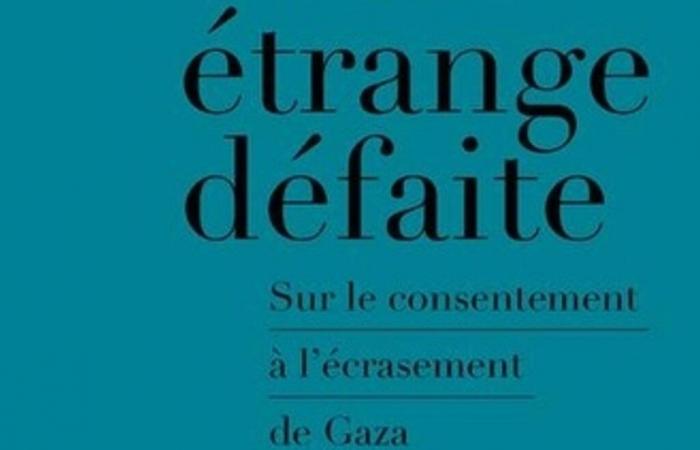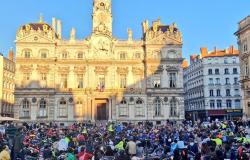
By publishing, on the site Blasta text entitled “Slandering critical analysts of the war in Gaza is no longer tolerable”, the French anthropologist Didier Fassin, the American philosopher Nancy Fraser and the Lebanese-Australian anthropologist Ghassan Hage say they want to respond to the “slander, insinuations and falsifications of facts” what, according to them, would be contained in the report of Didier Fassin’s new book, A strange defeat. On consent to the crushing of Gazapublished in “Le Monde des livres” on September 27, under the title “Didier Fassin deals with the facts”.
However, their response reproduces the errors and truncated information that the article noted in A strange defeatfocusing his criticism on the “distortion, by the author, of the content of his own sources”. Far from denying this criticism, the authors give it additional weight.
- Thus they qualify“false and unworthy accusations” the elements presented in this sentence of the article: “It was not because of ‘their condemnation of the massacres of civilians in Gaza’ that academics Nancy Fraser and Ghassan Hage were ousted from German universities, but for their challenge to Israel’s right to exist. » A sentence that they quote, while cutting the end: “… and, for the second, of his qualification of October 7 as an act of “resistance”. »
They seem to be confusing here the judgments made by German universities with those made by the article. Since Didier Fassin wrote that these evictions had been motivated by “condemnation of the massacres of civilians in Gaza” expressed by the two intellectuals, the question, in an article evaluating the rigor of his book, was to know if this was indeed the reason given by these institutions.
That’s not the case, and that’s all the article was pointing out. Their challenge to Israel’s right to exist was each time at issue, explicitly, with regard to Nancy Fraser – see the press release published by the University of Cologne -, implicitly, with regard to Ghassan Hage, to whom the The Max Planck Institute, in its own press release, criticized having published messages on social networks “incompatible with [s]fundamental values ». Implicitly, but clearly, since his decision followed the article published four days earlier by The worldwho summarized the anthropologist’s positions by speaking of “hatred of Israel”.
The German magazine cited, among other things, a blog note, reprinted on X, in which Ghassan Hage wrote, on October 7, 2023: “The Palestinians’ capacity for resistance is infinite. They don’t just dig tunnels. They can also fly over walls. » This is also what “Le Monde des livres” recalled, emphasizing that Ghassan Hage was criticized for describing October 7 as“act of “resistance””. - The authors accuse the article of seeking to “denigrate” at once A strange defeat and UNRWA, the UN agency for Palestinian refugees, by criticizing the way in which Didier Fassin cites the report on the latter, submitted on April 22 to the UN. “The World of Books”, they write, “claims that there are “two anti-Semitic occurrences” in the school books she uses. However, the “final report” indicates that the two formulations in question, in manuals written by the Palestinian Authority, were from 2020, for one, “deleted”, and for the other, “significantly altered””.
How can we delete or alter what does not exist? By recognizing that “two anti-Semitic occurrences” were present, the authors in fact correct an error by Didier Fassin, who wrote that this report had attested to the“absence of anti-Semitic formulations in school books”. However, they omit, in their citation of the report, what is noted on page 28 regarding the occurrence “significantly altered” : “It is unclear whether this change actually removed anti-Semitic content. » - “To establish a desire to exaggerate the reality of Islamophobia, the article questions the threefold increase in “anti-Muslim acts” in the fourth half of 2023”write the authors, without mentioning the criticism actually formulated in the article, on the erroneous calculation made by Didier Fassin when he writes that the anti-Semitic acts recorded have been multiplied by « 2,5 » between 2022 and 2023, while they were by 3.8, an inaccuracy which makes Didier Fassin’s entire reasoning on this subject misleading.
His reader could, in fact, believe that anti-Semitic acts had increased less – 2.5 – than Islamophobic acts – 3 –, whereas the first figure is false and the second, even without this error, would not have allowed a relevant comparison – no one is supposed to compare a quarterly evolution and an evolution from one year to the next. Between 2022 and 2023, Islamophobic acts increased 1.3 times. - The authors finally write: “To make people believe in a will [dans le livre] to delegitimize the ban on a conference at Lyon-II, it is asserted [dans l’article] that this cancellation was not decided “at the request of the Representative Council of Jewish Institutions”, when the daily cited made it the title of its report. »
However, they refer, via an Internet link (present in their text at the time of writing these lines, Sunday October 20), to the daily Progresswhose title is actually “Lyon-II University: a conference deemed pro-Palestinian canceled at the request of the prefecture”. That is, precisely, what the article in “World of Books” says – on this particular point as well as on the general question of the distortion of sources.
Books





